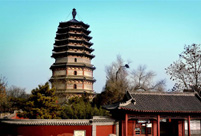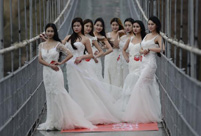


Chinese President Xi Jinping presides over a symposium after touring China's three leading news providers in Beijing on Feb. 19, 2016.
Chinese President Xi Jinping recently made an inspection tour of People's Daily, Xinhua News Agency and CCTV, during which time he presided over a symposium on Chinese media. The symposium, which took place shortly after the lunar Chinese New Year, attracted wide-ranging attention.
During the symposium, Xi ordered news media run by the Communist Party of China (CPC) and the Chinese government to strictly follow the Party's leadership, saying that it should serve the country's overall interests. Newsrooms across the world have been abuzz since Xi’s remarks.
Voice of America (VOA), for example, interpreted the statements as “the latest sign of the Party's increasingly tighter control over all media.”
As a matter of fact, China has been placing importance on the guiding role of media since the founding of the Communist Party of China.
It was Mao Zedong, one of the founding fathers of the Party, who once said that media and military power have equal importance. Mao was also the first to coin the term “statesman-run newspapers,” meaning that the Party should guide public opinion through media.
After the founding of New China, plenty of Mao’s articles on state and party management were published by People's Daily and other state media. It now is a tradition for Chinese leaders.
In addition, state-run media speaking for its country is not a new practice. This also occurs in the West.
It's hard to imagine companies affiliated with the conglomerate of media giant Rupert Murdoch denouncing him publicly, since media founded by a financial group will almost always speak for it.
VOA, as a mouthpiece of the U.S., will also defend its government. From this point of view, each country does the same, but some may be better skilled at covering their true intentions.
Those who try to deny this fact are simply naive about politics.
However, those saying that Xi’s statements indicate a restriction on freedom of speech are making groundless accusations.
First of all, the domestic media industry is undergoing an unprecedented transformation. At present, traditional media is facing double pressure from both audiences and digital media.
Against such a backdrop, traditional mainstream media, losing ground to commercial portals, has to reform its original approach and break with the bureaucratized system.
When it comes to the international arena, China, with its rising standing, is always the subject of worldwide speculation. Its every move is watched by global media.
However, China still has a relatively weak voice in the international community. Given that there are barely any Chinese media outlets with strong international influence that can tell the “Chinese story,” China’s voice can barely be heard on the international stage.
Thus, the Party is encouraging state-run media to guide public opinion by focusing more on innovative approaches in line with new trends in the media industry--not imposing more restraints.
China's ongoing reform calls for an urgent change in public opinion, ideology and intellectual support. All media should make efforts to implement the principle and direction set forth by the central government.
In the next few years, Chinese media will enter a promising future.
(This article is edited and translated from 中國要“收緊”輿論了嗎? Source: www.haiwainet.cn)
 2016 Miss Chinatown USA pageant held in San Francisco
2016 Miss Chinatown USA pageant held in San Francisco Ancient pagodas across China
Ancient pagodas across China Beijing Film Academy starts 2016 entrance exam
Beijing Film Academy starts 2016 entrance exam Wedding dress show up in the air
Wedding dress show up in the air Have you ever taken these beautiful subways in China?
Have you ever taken these beautiful subways in China? Russian photographer brings fairytales to life
Russian photographer brings fairytales to life Chinese beauties, foreign models meet in Chengdu
Chinese beauties, foreign models meet in Chengdu Awesome! Aerial pictures taken on J-11 fighter
Awesome! Aerial pictures taken on J-11 fighter A foreign girl explains what China should be proud of
A foreign girl explains what China should be proud of Top 20 hottest women in the world in 2014
Top 20 hottest women in the world in 2014 Top 10 hardest languages to learn
Top 10 hardest languages to learn 10 Chinese female stars with most beautiful faces
10 Chinese female stars with most beautiful faces China’s Top 10 Unique Bridges, Highways and Roads
China’s Top 10 Unique Bridges, Highways and Roads Chinese biologists offer solution to Brazilian Zika panic
Chinese biologists offer solution to Brazilian Zika panic Drone sellers, experts say new rules are unfit for purposea
Drone sellers, experts say new rules are unfit for purposea The tragedies and troubles of the women who unknowingly marry gay men
The tragedies and troubles of the women who unknowingly marry gay men Antique repair documentary becomes unexpected hit among China’s youth
Antique repair documentary becomes unexpected hit among China’s youthDay|Week